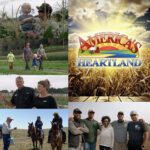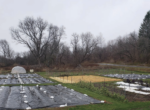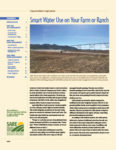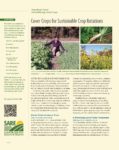Showing 1-10 of 18 results

Farming Strategies for Adapting to Extreme Weather
SARE partnered with PBS KVIE to produce an episode of RFD-TV's America's Heartland that highlights how farmers and ranchers across the United States are using sustainable and regenerative practices to adapt to increasingly challenging and unpredictable weather conditions. Adapting to Flooding and Drought on Hurricane Flats Farm in South Royalton, Vermont Ashley Loehr and Antoine […]

Tarping in the Northeast: A Guide for Small Farms
Reusable tarps, including black plastic (silage tarps), clear plastic and landscape fabric, are multi-functional, accessible tools that are increasingly popular on small farms. The use of opaque materials that block light is frequently called “occultation,” while the use of clear tarps is called “solarization.” The use of the word "tarping” is a general term to […]

Soil Health Principles and Practices Videos
Experienced farmers and Sustainable Agriculture Research and Education (SARE) provide information on managing and improving soil health. Farmers discuss practices such as cover cropping, and using mulch and compost to improve soil health.

New “Cover Crops and Soil Health” Video from SARE
The newest episode of SARE’s "What is Sustainable Agriculture" animation series illustrates how producers can use cover crops to improve productivity and sustainability. In just a few short minutes, “Cover Crops and Soil Health” outlines how cover crops can build soil structure, protect water quality, suppress pests and improve a farm's bottom line. Combining cover […]

Smart Water Use on Your Farm or Ranch
As producers throughout the nation grow increasingly concerned about water scarcity, farmers, ranchers and agricultural educators are beginning to explore new, conservation-oriented approaches to water use.

What is Soil Health?
Soil health plays an essential role in raising healthy, productive crops and livestock. With this interactive infographic, learn how practices such as cover crops, no-till, crop rotation and the integration of livestock work in concert to improve soil health.

Improving Soil Health Through Cover Crops
Farmers around the country are discovering the power of cover crops to curb erosion and improve soil health. This video is from Pennsylvania, where a Penn State researcher and a grain farmer are partnering to spread the word.

Economic and Environmental Aspects of Cover Crops
Economics of Cover Crops Business Opportunities with Cover Crops and Soil Health Environmental Impacts of Cover Crop Systems
Managing Cover Crops for Ecosystem Services in Vegetable Systems
Natalie Lounsbury (University of New Hampshire) discusses how to manage cover crops for such ecosystem services as: suppressing weeds, attracting pollinators, cycling nutrients, promoting biological diversity and controlling erosion.

Cover Crops for Sustainable Crop Rotations
Cover crops are one of the best ways to improve soil health, reduce off-farm inputs and protect natural resources. Find a wealth of educational materials developed out of decades of SARE-funded cover crop research.